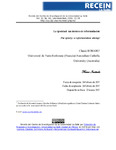| dc.contributor.author | Romano, Claude | |
| dc.date.accessioned | 2019-02-28T03:21:07Z | |
| dc.date.issued | 2016-12 | |
| dc.identifier | http://revistasinvestigacion.lasalle.mx/index.php/recein/article/view/1205 | |
| dc.identifier.citation | Romano, C. (2016). La ipseidad: un intento de reformulación. Revista del Centro de Investigación de la Universidad La Salle, 12(46), 11-38. | es_MX |
| dc.identifier.issn | 1405-6690 | |
| dc.identifier.issn | 1665-8512 | |
| dc.identifier.other | https://doi.org/10.26457/recein.v12i46.1205 | |
| dc.identifier.uri | http://revistasinvestigacion.lasalle.mx/index.php/recein/article/view/1205/1833 | |
| dc.description.abstract | En mis dos obras consagradas al problema del acontecimiento siempre he formulado mi pensar en los términos de un pensamiento de la ipseidad y no del yo (moi). Hoy son numerosos los autores que emplean estos dos conceptos como cuasisinónimos. Sin embargo, pienso que ambos conceptos responden a un tipo diferente de preguntas y que deben ser distinguidos. Este es el punto que quisiera aclarar en las reflexiones siguientes retomando al primer autor que ha hecho un uso peculiar de un concepto que en francés se traduce usualmente por «ipseidad», a saber, el concepto heideggeriano de Selbstheit. Por tanto, la siguiente exposición será una tentativa de explicación del concepto de ipseidad partiendo de Heidegger, y una defensa en favor de este concepto, como una alternativa a aquel –mucho más problemático a mis ojos–de yo (moi); una alternativa al camino de las egologías que han triunfado en la filosofía desde Descartes hasta Husserl. | es_MX |
| dc.description.abstract | In my two works dedicated to the problem of the event, I have always formulated my thinking in terms of the ipseity as a thought and not as a thinking to the self (moi). Today, there are many authors who use these two concepts as quasisynonyms. However, I think that both concepts respond to a different type of questions and that they should be distinguished. This is the point I would like to make clear in the following reflections, referring to the first author who has made a peculiar use of a concept which in French is usually translated by "ipseity", namely, the Heideggerian concept of Selbstheit. Therefore, the following exposition will be both an attempt to explain the concept of ipseity from Heidegger and a defense in favor of this concept as an alternative to that -much more problematic in my eyes -of I (moi), an alternative to the way of the egologies that have triumphed in philosophy from Descartes to Husserl. | es_MX |
| dc.format | application/pdf | es_MX |
| dc.language.iso | spa | es_MX |
| dc.publisher | Universidad La Salle México, Dirección de Posgrado e Investigación | es_MX |
| dc.rights | Derechos de autor 2017 Revista del Centro de Investigación de la Universidad la Salle | es-ES |
| dc.rights | Acceso abierto | es_MX |
| dc.rights.uri | http://creativecommons.org/licenses/by-nc-nd/4.0 | * |
| dc.subject | Ipseidad | es_MX |
| dc.subject | Yo | es_MX |
| dc.subject | Dasein | es_MX |
| dc.subject | Ipseity | es_MX |
| dc.subject | I | es_MX |
| dc.subject.classification | HUMANIDADES Y CIENCIAS DE LA CONDUCTA::FILOSOFÍA::ANTROPOLOGÍA FILOSÓFICA | es_MX |
| dc.subject.other | Mismidad | es_MX |
| dc.title | La ipseidad: un intento de reformulación | es_MX |
| dc.title.alternative | The ipsiety: a reformulation attempt | es_MX |
| dc.type | article | es_MX |
| dc.identificator | 4||72||7202 | es_MX |
| dc.audience | generalPublic | es_MX |







